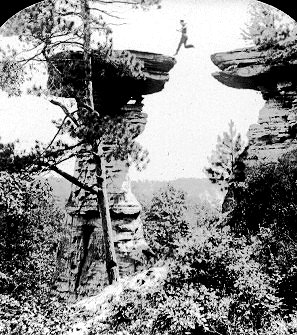The Reckless Survive
Today, we wonder why the reckless survive. The University of Houston's College of Engineering presents this series about the machines that make our civilization run, and the people whose ingenuity created them.
So why do the reckless survive? They expose themselves to more danger. Surely that threatens their Darwinian survival. You'd expect each generation to be more careful than the last.
But recklessness does survive -- generation after generation. Maybe we need risk-taking for survival. The hunter who won't face a buffalo will starve. The parent who won't risk her life to save her child faces Darwinian extinction.
Author Melvin Konner asks us to look more closely at the risk-taker -- the sensation-seeker. Psychologists talk about four faces of that person. The first is thrill and adventure seeking -- race cars and mountain-climbing. The second is experience seeking -- like travel or new friends. The third is disinhibition -- hedonism in its various forms. Fourth is boredom susceptibility -- simply being unable to bear routine.
That list caught me short. It embarrassed me. For years I've praised the inventive mind. Now a psychological profile for recklessness fits the inventive mind perfectly.
Thrill and adventure seeking is at the heart of creativity. The Eureka moment is a mountain-top experience, make no mistake! And we chance terrible frustrations and defeat to get there.
Experience seeking means opening ourselves to the dangers of change. That's how we forge creative connections.
Creativity is certainly hedonistic. The moment of discovery is pure pleasure. Like other physical pleasures, it's a moment of letting-go -- of abandoning control.
And invention is the only real way to beat back boredom. It takes off the comfortable protective old shoe of familiarity.
The reckless survive because invention is the prime act of human recklessness. It's also our major survival trait. Unlike bears, we can't survive the cold without heaters and houses. Unlike lions, we can't kill prey without weapons. Unlike oxen, we can't graze grass that we didn't plant and harvest.
Recklessness is more than entering a burning house to save our child. For our frail species it is that, but it's more. It's the courage of the creative spirit. It's the hedonistic pleasure of abandoning control. It's risking change.
We're the only species that must give its future over to the fruit of its inventions. That's dangerous business. And some of the reckless among us do perish. But recklessness survives, just because our species depends upon it.
I'm John Lienhard, at the University of Houston, where we're interested in the way inventive minds work.
(Theme music)
Konner, M., Why the Reckless Survive, and Other Secrets of Human Nature. New York: Penguin Books, 1991, pp. 125-139.
I'm most grateful to Mr. Herbert I. Goodman, Chairman of the Board of Applied Trading Systems, Inc., for suggesting that I do this episode.

Stereopticon photo courtesy of Margaret Culbertson

clipart